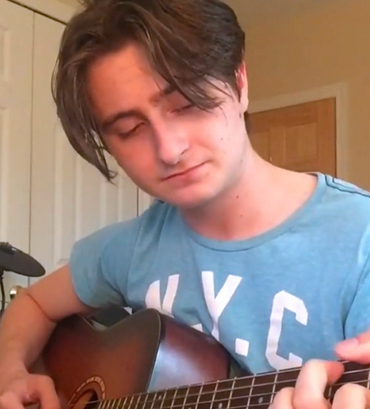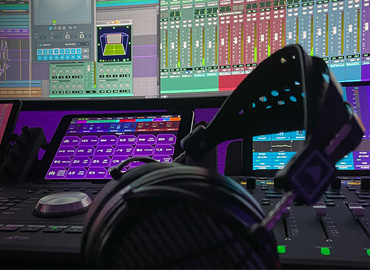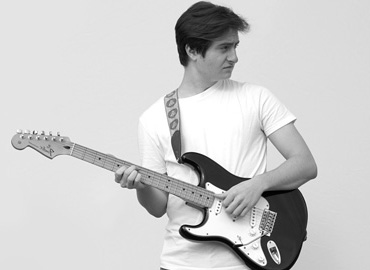
Artist Profile: Liam Barrack
TORONTO MUSICIAN // BAND
IMSTA: Hi Liam, can you tell us a little bit about yourself?
LB: I was born and raised in Toronto, Canada. I’m currently in university for a double major in music and computer science. I started doing music from a very young age; my parents made me take ten years of piano training, and, ironically, I hated every second of it. It wasn’t until around grade 10 that I started getting interested personally in music, and I began teaching myself guitar and jamming with anyone who was interested. Since then I’ve been working with a producer and various other people who help me create fully fleshed out versions of the songs I write. My goal is to have my music career permit be self-sustaining, so that I may focus on it full time.
IMSTA: How long have you been writing songs?
LB: I’ve been writing music since I was about 8 years old. Very early on this manifested as broken riffs and short musical themes that felt good to listen to. I’d spend a lot of time trying to make them sound perfect. I went through a few different phases of the types of music I created. After grade 10, when I started teaching myself guitar, I began trying to fully finish the musical ideas I came up with. I was generally proud of the results so I went to a recording studio near my house and booked time with some of the producers there to help me create final versions of all the voice memos I’d created. So, overall, I have been writing songs for about 14 years.

IMSTA: How would you describe your music?
LB: I’d say my music is largely a reflection of what is most on my mind, often those things that are making me most anxious or sad at the time they are written. A lot of the time I tend to personify existential concepts so that I can address them as entities, and objectify their consequences. At the end of the day, it’s built to be pop music.
IMSTA: Who would you say are some of your favorite or most influential musicians?
LB: My influences have mutated considerably since I began writing full songs. When I first started teaching myself guitar, my primary inspiration (albeit a bit cliché) was Jimi Hendrix. I loved the syntax of his music, and the catchiness of it all despite its complexity. Once I began to move away from writing rock/psychedelic music, I drew a lot from many different musicians I found while searching around for good music. I don’t really have a favorite musician anymore, just a set of songs that I like more than the rest.
IMSTA: What kind of gear and software do you personally use?
LB: I personally don’t use any software; I have a producer I go to when my songs are fully written, and have them produced with him. That said, he uses Pro Tools and a variety of plugins to get the sound right.

IMSTA: Can you tell us about the story and process of your finalist song entry, “Sick Kisses”?
LB: It’s a bit of a strange story. Two years ago, I dated this girl from my university who was in the drama department. We were together for nine months, which at the time was my longest relationship. During the summer, two weeks before school was supposed to start back up, she broke up with me, and it, having been the longest-lived relationship in my short life, was very emotionally devastating. After school started back up, we met up for a sort of post-mortem check in to see how we were both doing. In classic early-life relationship fashion, we got back together for a week, before breaking up again for good. However, during the week that we were briefly back together, she was very sick, and obviously got me super sick as well. It was around this time that she told me she’d written a play about me, and our break-up, and that she was going to have it performed for the whole school as a part of the drama department; and that I should come see it as it might provide some ‘clarity’. After hearing this, I thought to myself ‘well if she’s providing clarity, I might as well provide some as well’. And so, Sick Kisses was born, with the message of ‘I would do anything for you, but I can’t be around you if I can’t be with you’, and a not-so subtle nod to the fact that she got me ridiculously sick.
IMSTA: How did you hear about IMSTA?
LB: I wanted to submit my music to competitions to get it out there for others to hear. I searched around the internet and learned about the IMSTA competition. It sounded like a cool organization so I submitted my song (and am definitely glad I did).
IMSTA: Have you ever been to IMSTA FESTA? If yes, what was your opinion of the event?
LB: Unfortunately, I have not but hope to be able to attend in the future once Covid gets under control.
IMSTA: What do you think about IMSTA’s message
LB: I think IMSTA’s message is an important one. It’s vital that people purchase and own their software legitimately. If you think about the logistics of it, all piracy does is diminish the potential of a given product; The less money spent on the product, the less money the creators will have to maintain and update it.

IMSTA: What advice would you give to someone who wants to become a songwriter?
LB: I would say: don’t think about it as songwriting, so much as about it as an expression of self. Focus more on what it is you are trying to say, or the emotions you want to capture, before trying to turn it into a structured piece of music. Otherwise, you’ll end up with music that doesn’t mean anything to you.
IMSTA: Any last shout outs?
LB: I guess if I had any it would be to my parents for being very supportive of my goals and aspirations.





